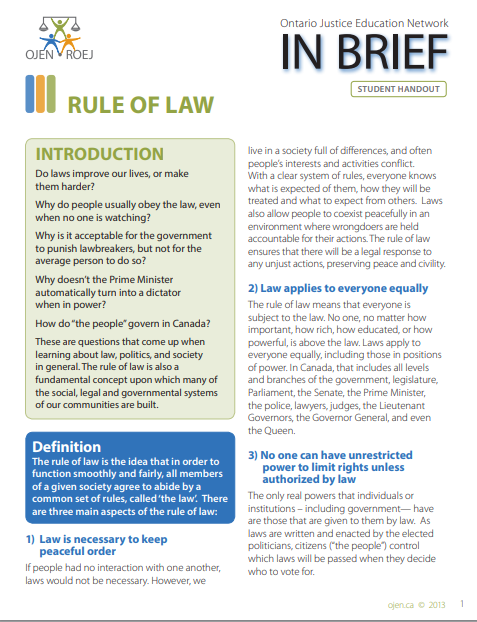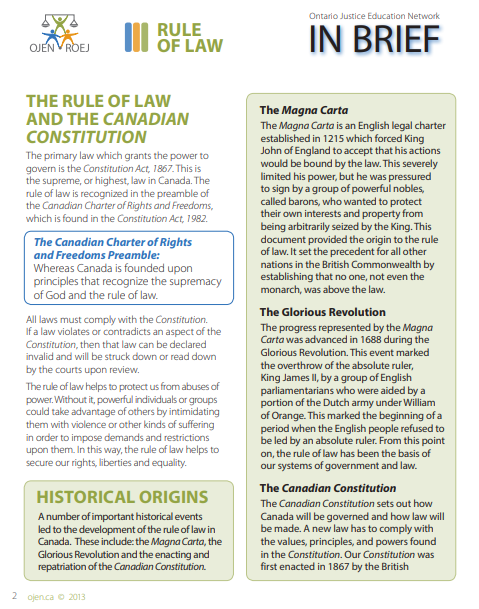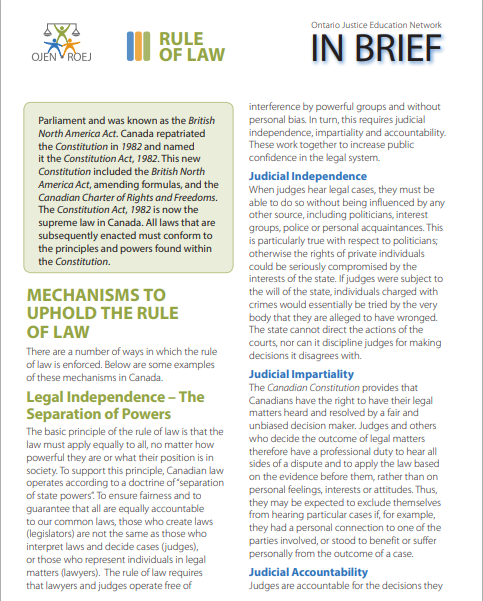







Ontario Justice Education Network OJEN VROEJ IN BRIEF STUDENT HANDOUT RULE OF LAW INTRODUCTION live in a society full of differences, and often people's interests and activities conflict. Do laws improve our lives, or make With a clear system of rules, everyone knows them harder? what is expected of them, how they will be Why do people usually obey the law, even treated and what to expect from others. Laws when no one is watching? also allow people to coexist peacefully in an environment where wrongdoers are held Why is it acceptable for the government accountable for their actions. The rule of law to punish lawbreakers, but not for the ensures that there will be a legal response to average person to do so? any unjust actions, preserving peace and civility. Why doesn't the Prime Minister automatically turn into a dictator 2) Law applies to everyone equally when in power? The rule of law means that everyone is How do "the people" govern in Canada? subject to the law. No one, no matter how important, how rich, how educated, or how These are questions that come up when powerful, is above the law. Laws apply to learning about law, politics, and society everyone equally, including those in positions in general. The rule of law is also a of power. In Canada, that includes all levels fundamental concept upon which many of and branches of the government, legislature, the social, legal and governmental systems Parliament, the Senate, the Prime Minister, of our communities are built. the police, lawyers, judges, the Lieutenant Governors, the Governor General, and even the Queen. Definition The rule of law is the idea that in order to 3) No one can have unrestricted function smoothly and fairly, all members power to limit rights unless of a given society agree to abide by a authorized by law common set of rules, called the law: There The only real powers that individuals or are three main aspects of the rule of law: institutions - including government- have are those that are given to them by law. As 1) Law is necessary to keep laws are written and enacted by the elected peaceful order politicians, citizens ("the people ) control which laws will be passed when they decide If people had no interaction with one another, who to vote for. laws would not be necessary. However, we ojen.ca @ 2013Ontario Justice Education Network RULE OJEN ROEJ OF LAW IN BRIEF THE RULE OF LAW AND THE CANADIAN The Magna Carta The Magna Carta is an English legal charter CONSTITUTION established in 1215 which forced King The primary law which grants the power to John of England to accept that his actions govern is the Constitution Act, 1867. This is would be bound by the law. This severely the supreme, or highest, law in Canada. The limited his power, but he was pressured rule of law is recognized in the preamble of to sign by a group of powerful nobles, the Canadian Charter of Rights and Freedoms, called barons, who wanted to protect which is found in the Constitution Act, 1982. their own interests and property from being arbitrarily seized by the King. This The Canadian Charter of Rights document provided the origin to the rule and Freedoms Preamble: of law. It set the precedent for all other Whereas Canada is founded upon nations in the British Commonwealth by principles that recognize the supremacy establishing that no one, not even the of God and the rule of law. monarch, was above the law. All laws must comply with the Constitution. The Glorious Revolution If a law violates or contradicts an aspect of the The progress represented by the Magna Constitution, then that law can be declared Carto was advanced in 1688 during the invalid and will be struck down or read down Glorious Revolution. This event marked by the courts upon review. the overthrow of the absolute ruler, King James II, by a group of English The rule of law helps to protect us from abuses of parliamentarians who were aided by a power. Without it, powerful individuals or groups portion of the Dutch army under William could take advantage of others by intimidating of Orange. This marked the beginning of a them with violence or other kinds of suffering period when the English people refused to in order to impose demands and restrictions be led by an absolute ruler. From this point upon them. In this way, the rule of law helps to on, the rule of law has been the basis of secure our rights, liberties and equality. our systems of government and law. HISTORICAL ORIGINS The Canadian Constitution The Canadian Constitution sets out how A number of important historical events Canada will be governed and how law will led to the development of the rule of law in be made. A new law has to comply with Canada. These include: the Magna Carta, the the values, principles, and powers found Glorious Revolution and the enacting and in the Constitution. Our Constitution was repatriation of the Canadian Constitution. first enacted in 1867 by the British 2 ojenica @ 2013Ontario Justice Education Network RULE OJEN VROEJ OF LAW IN BRIEF interference by powerful groups and without Parliament and was known as the British personal bias In turn, this requires judicial North America Act. Canada repatriated independence, impartiality and accountability. the Constitution in 1982 and named These work together to increase public it the Constitution Act, 1982. This new confidence in the legal system. Constitution included the British North America Act, amending formulas, and the Judicial Independence Canadian Charter of Rights and Freedoms. When judges hear legal cases, they must be The Constitution Act, 1982 is now the able to do so without being influenced by any other source, including politicians, interest supreme law in Canada. All laws that are subsequently enacted must conform to groups, police or personal acquaintances. This the principles and powers found within is particularly true with respect to politicians; otherwise the rights of private individuals the Constitution. could be seriously compromised by the interests of the state. If judges were subject to MECHANISMS TO the will of the state, individuals charged with UPHOLD THE RULE crimes would essentially be tried by the very body that they are alleged to have wronged. OF LAW The state cannot direct the actions of the courts, nor can it discipline judges for making There are a number of ways in which the rule decisions it disagrees with. of law is enforced. Below are some examples of these mechanisms in Canada. Judicial Impartiality The Canadian Constitution provides that Legal Independence - The Canadians have the right to have their legal Separation of Powers matters heard and resolved by a fair and The basic principle of the rule of law is that the unbiased decision maker. Judges and others law must apply equally to all, no matter how who decide the outcome of legal matters powerful they are or what their position is in therefore have a professional duty to hear all society. To support this principle, Canadian law sides of a dispute and to apply the law based operates according to a doctrine of *separation on the evidence before them, rather than on of state powers. To ensure fairness and to personal feelings, interests or attitudes. Thus, guarantee that all are equally accountable they may be expected to exclude themselves to our common laws, those who create laws from hearing particular cases if, for example, (legislators) are not the same as those who they had a personal connection to one of the interpret laws and decide cases (judges), parties involved, or stood to benefit or suffer or those who represent individuals in legal personally from the outcome of a case. matters (lawyers). The rule of law requires Judicial Accountability that lawyers and judges operate free of Judges are accountable for the decisions theyOntario Justice Education Network RULE OJEN VROEJ OF LAW IN BRIEF make because parties have the right to appeal Each new decision or interpretation sets a these decisions to a higher court. Only the precedent that must be considered in similar Supreme Court of Canada has the power to cases by other judges in the future. make a legal decision that cannot be reviewed. Second, the laws that are available for judges Lawyer Independence to apply and interpret can also change. Laws It is essential to the rule of law that lawyers that are enacted this way are called statute can represent the interests of their clients law. Statute law is created and changed when without interference or bias. The law is politicians introduce, debate, and finally complicated and one role of the lawyer is approve new legislation. Ordinary Canadians to ensure that their client's case is brought can participate in this process by trying to elect forward and heard. This, too, helps to ensure politicians whose ideas about government public confidence in the rule of law because represent, or correspond to, their own or by it works to ensure that the law is applied trying to influence the outcome through fairly. Lawyers, therefore, have a professional political action such as educating others, obligation to be loyal to the interests of their joining lobby groups or simply making their clients. However, as officers of the court, they views known to their elected representatives. are bound to do so while operating within the bounds of the law itself. They cannot, for Police example, knowingly hide evidence that would Police enforce the Criminal Code of Canada confirm their clients' guilt. and some other laws relating to crime and safety. Police investigate crime and charge Laws those who break the law. In Canada, there Laws do a number of things. Some, like the are police agencies operating at the national, Criminal Code of Canada, tell people what provincial and municipal levels. Our national they must, can and cannot do. Others, like the police service is the Royal Canadian Mounted Canadian Constitution, set out basic procedures Police (R.C.M.P). Three provinces (Ontario, for government and the rights and freedoms Quebec and Newfoundland) have provincial of people within Canada's boundaries. police forces, and there are over 150 municipal and over 50 First Nations policing agencies as However, the law is not static. It is often said well. Their powers are set out in laws that limit that law is like a "living tree" - that is, like a the methods of police investigation and try living thing, it needs to change and adapt to balance the public need to enforce the law as society changes. In Canada, there are two with the need to protect the privacy main ways in which the law changes. First, of individuals, who are assumed to be innocent when judges interpret the law in deciding of any wrongdoing until proven otherwise cases, they sometimes do so in new ways. in court. Finally, it is important to note that This is how case law - or common law-can numerous mechanisms and agencies exist change over time. to keep police powers in check by allowing 4 ojenica @ 2013Ontario Justice Education Network RULE OJEN VROEJ OF LAW IN BRIEF individuals to make public complaints causing suffering; about police actions. This helps to ensure . Removal: separating potentially harmful that effective policing is provided to the community in a fair and accountable manner. people from the rest of society . Restitution: returning things, especially Courts finances, to the way they were before the offence; These institutions hold people accountable for their actions, hear cases where the law . Restoration. making the victim emotionally has allegedly been broken, assign remedies/ whole and reintegrating the offender into punishments to those involved, and create society; new common law through the precedents set . Rehabilitation: teaching offenders new skills in their rulings. Courts also interpret the law and attitudes and strategies to help them and determine which laws are constitutionally avoid negative behaviour in the future; and sound and when people of authority are -or . Reinforcement: setting an example so that are not-acting within the law. In Canada, the public knows that harmful actions will courts can be distinguished according to the be met with just consequences. kinds of cases that are heard in each. There are different courts for criminal, civil, military, youth Sanctions range tremendously in both type and family matters, to name a few. Courts of and seriousness. They include relatively appeal exist so that individuals can have the minor penalties, such as a public record of opportunity to have legal decisions reviewed, an offence, fines, and demerit points taken and perhaps changed, when they believe these against a driver's license or court orders decisions to be unfair or legally incorrect. to perform a given number of hours of community service. At the opposite end of Sanctions the spectrum are sanctions like incarceration (imprisonment) for various periods of time and Sanctions are the penalties that are received capital punishment (the death penalty). as a result of breaking various laws, regulations or legal agreements with other parties, or causing undue harm to others. In general, Administrative Review sanctions provide a reason for individuals and Not all legal disputes are settled in courts, or by groups to comply with rules and to be fair judges or justices of the peace. In many cases, and conscientious when dealing with one the government can delegate authority to another. In this way, they help to enforce the other bodies that can hear evidence and make rule of law. They do this in one or more of the decisions about government actions. Some following ways: examples are the Landlord-Tenant Board, which makes rulings on disputes between . Retribution: taking revenge against the property owners and people who rent from wrongdoer for breaking the law and them; the Immigration and Refugee Board ojen.ca @ 2013 SOntario Justice Education Network RULE OJEN VROEJ OF LAW IN BRIEF of Canada, which applies the law in evaluating claims of refugee status and in deciding 4. Select three mechanisms that support the whether individuals who wish to immigrate rule of law and discuss their significance. to Canada will be admitted; and provincial Give a unique example of each. human rights commissions, which hear cases pertaining to human rights complaints between private individuals. DISCUSSION QUESTIONS 1. In your own words, summarize the three aspects of the rule of law. 5. Describe an everyday occurrence that would be chaotic if not for the rule of law. Identify what laws or mechanisms are in place to keep that situation orderly. 2. How does the rule of law protect our liberty? 3. Discuss the significance of the Magna Carta and the Glorious Revolution to the development of the rule of law in Canada. 6 ojenica @ 2013Ontario Justice Education Network RULE OJEN ROEJ OF LAW IN BRIEF CASE STUDY: RONCARELLI V DUPLESSIS ordered Mr. Duplessis to compensate Mr. Roncarelli. Mr. Duplessis appealed the Roncarelli v Duplessis is a Canadian case decision to the Quebec Court of Appeal, which illustrates the significance and which overturned the lower court's function of the rule of law. This case took decision. Mr. Roncarelli then appealed place in Quebec during a time where that decision to the Supreme Court there was immense tension between the of Canada (SCC), which reinstated the dominant Roman Catholic Church and original trial decision. other religious groups. In a majority decision, the SCC ruled that The complainant, Mr. Roncarelli, was a Mr. Duplessis wrongfully caused the successful restaurant owner in Quebec revocation of Mr. Roncarelli's liquor license and a very active member of the Jehovah's and that it was outside of his jurisdiction Witness community. Mr. Roncarelli often as Premier to do so. The SCC also ruled helped Jehovah's Witnesses who were that Mr. Duplessis, in his role as a Premier, arrested by posting their bail so that they was not entitled to diplomatic immunity could continue their lives outside of prison and is not above the law. while awaiting trial. In fact, he did so more Questions than 350 times in a three-year period. 1) Did Mr. Roncarelli have the right to post bail Many Catholic politicians and public for members of his religious community? officials were not happy with his Why might this have been a nuisance for involvement. As a result, the chief public officials? prosecutor contacted the Premier, Mr. Duplessis, to inform him about Mr. Roncarelli's actions. Mr. Duplessis took it upon himself to contact the Quebec Liquor Commission and had Mr. Roncarelli's liquor license revoked. Mr. Roncarelli lost money and eventually had to sell his business. When he discovered why he had lost his liquor licence, Mr. Roncarelli brought court action against Mr. Duplessis suing him for damages. The Quebec Court of Queen's Bench decided in Mr. Roncarelli's favour andOntario Justice Education Network RULE OJEN ROEJ OF LAW IN BRIEF 2) Was Mr. Duplessis' response appropriate? 5) How is it important to society as a whole that Why or why not? the SCC found in favour of Mr. Roncarelli? 3) Who do you think had more power in society Mr. Duplessis or Mr. Roncarelli? Why? 4) Which of the three aspects of the rule of law did Mr. Duplessis violate? 6) What do you think would have happened to society had the SCC found in favour of Mr. Duplessis? ojen.ca @ 2013 8






















